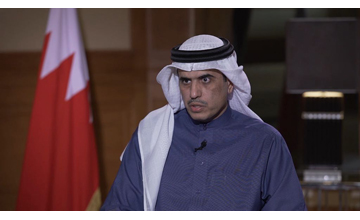ID :
482203
Sat, 02/24/2018 - 22:46
Auther :
Shortlink :
https://www.oananews.org//node/482203
The shortlink copeid
Information minister: Qatari media spread hatred

Manama, Feb. 24 (BNA): Information Affairs Minister, Ali bin Mohammed Al-Romaihi, has stressed that the Arab media is facing continuous campaigns against its countries, which cast a shadow over its influence on the Arab public opinion and its focus on its national issues.
In an interview with the Egyptian “Al-Mehwar” channel, Al-Romaihi said that one of the biggest problems that restrict the impact of the media on Arab viewers today is their attempt to compete with social media networks, something that should not be done by the traditional media.
The minister pointed out that the Arab satellite channels have exceeded 1,300 during the past decade, which increases responsibility of the Arab media to engage in competitiveness and improve programmes.
Responding to a question about the negative role played by the Qatari Al-Jazeera channel, Al-Rumaihi said that the Qatari media, especially Al-Jazeera, continues to incite against Arab countries and cause harm to everything related to them.
Al-Jazeera has recently lost a lot of its influende and no longer has an impact on the Arab viewers because of the lack of credibility and principles, he added.
“Al-Jazeera has become unable to convince itself, so how will it be able to convince the Arab viewers?” Al Romaihi wondered.
The minister affirmed that the Qatari crisis exposed the role of Qatar's Al-Jazeera channel as a tool for the Doha regime to implement its agendas, polish its image and abuse the Arab countries, in general, and the countries calling for combating terrorism in particular.
He asserted that Al-Jazeera has been used badly, and history will not forget what Qatar has done in the region through this institution, which has spread the culture of hatred and caused a great rift among Arab countries and peoples, especially during the so-called Arab Spring.
Those who experienced the so-called Arab Spring will never forget the negative role played by Al-Jazeera at the time, a period whose negative results still continue today, he said, stressing that anything can be bought, but not history.
The minister said the situation with Qatar is not a conflict, but rather a firm political stance taken by the four countries calling for fighting terrorism against a state that has caused much damage to the region, pointing out that the 13 demands are still on the table.
When Doha responds to them positively the crisis will end, he said.
On Iran, Al-Rumaihi pointed out that those who try to minimise the Iranian threat against the Arab nation or try to convince the Arab viewer that Tehran is not a threat to the Arab countries are ignoring reality, stressing that Iran has tried to interfere in all Arab countries, without exception.
He affirmed said that Bahrain is the citadel where many Iranian conspiracies to enter the Arabian Gulf region have fallen apart, adding that the Qatari media is trying to portray Iran as a non-hostile state.
Iran is recognised as a state sponsor of terrorism by the whole world, he added.
Al-Romaihi pointed out that the kingdom boasts a deep-rooted media tradition and that the media had gone through a number of stages that helped shape its identity and form its character, stressing that freedom of expression in Bahrain is guaranteed by the Constitution and supported by the leadership, without prejudice or abuse.
The hostile campaigns against Bahrain have led the local media to assume a greater responsibility to face them, noting that during 2011-2015, the Bahraini media was reaction-based rather than proactive or initiator, which makes it necessary to adopt a new approach that makes the Bahraini media fully local and with the competence and ability to transfer local information abroad professionally.





